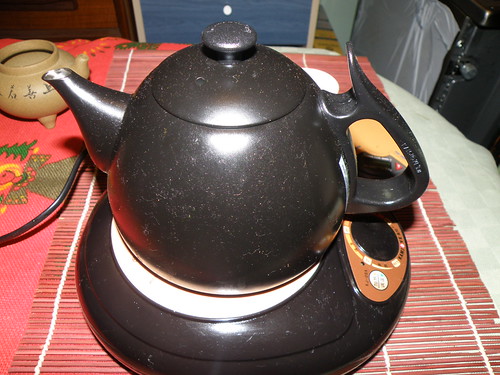How should I be heating it ?
I have just read a thread in Teaware which was on Tetsubins - A post near the end led to
http://hojotea.com/categ_e/tetsubin.htm
Which pronounces that testsubins are good for
Green Tea including Japanese Green Tea and Chinese Green Tea
Aged Pu-Erh Raw Tea: >10 Years
Pu-Erh Ripe Tea
Flower Tea
Yellow Tea
White Tea: Both normal clay and purple clay teapot will do.
But not good for
Oolong Tea
Black Tea (Red Tea)
Young Raw Pu-Erh
Reasoning
If it is used for the wrong category of tea such as oolong, the flavor becomes flat.
Tetsubin changes the taste of water because of the activated layer of iron. After casting, Iron kettle is baked in charcoal fire that reduces Fe3+ into Fe2+. The reduced iron Fe2+ actively interacts with the mineral and water and changes the size of clusters. The size of cluster becomes smaller and can easily react with the substances in tea.
Well I certainly don’t know much about Fe3+ or Fe2+
I wonder if I am alright with my Kamjove Stainless Steel, or should I be using a Glass Kettle like every Tea Trader that I visited in Malaysia was using.
My Kamjove

From Dragon Teahouse
http://cgi.ebay.com/Temperature-Adjusta ... m153.l1262
Or should I buy a Glass One
http://cgi.ebay.com/Glass-Kettle-Tea-Ar ... m153.l1262
Do Glass and Stainless steel equally preserve the Fe3+ characteristics of the water when heated.
But the water itself, which should I be using ?
I have noted recently on the boards some warnings about Evian. I use Volvic and Highland Spring and was thinking of posting a request asking for Opinions in the same forum. But having read about the different suitability of water for oolong as opposed to several other tea types, think this is a more appropriate forum.
What qualities in a bottled water should I be looking for when brewing Oolong ?
Volvic according to Wikipedia
Country France - Source Auvergne National Park
Type still - pH 7
Calcium (Ca) 10
Chloride (Cl−) 8
Bicarbonate (HCO3) 65
Magnesium (Mg) 6
Nitrate (NO3) 1
Potassium (K) 6
Silica (SiO2) 30
Sodium (Na) 9
Sulfates (SO) 7
Total Dissolved Solids 109
Highland Spring according to Wikipedia
2 slightly different sources
Country Scotland - Source Blackford, Perth and Kinross
Type Still - pH 7.8 (HS1), 7.7 (HS2)
Calcium (Ca) 32 (HS1), 50.8 (HS2)
Chloride (Cl−) 5.0 (HS1), 5.9 (HS2)
Bicarbonate (HCO3) 133 (HS1), 199 (HS2)
Magnesium (Mg) 8.0 (HS1), 9.5 (HS2)
Nitrate (NO3) <2.0 (HS1), <3.0 (HS2)
Potassium (K) 0.5 (HS1), 0.7 (HS2)
Silica (SiO2) Unknown
Sodium (Na) 4.5 (HS1), 5.5 (HS2)
Sulfates (SO) 7.0 (HS1), 5.8 (HS2)
Total Dissolved Solids 136 (HS1), 190 (HS2)